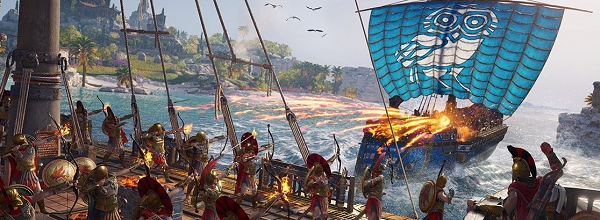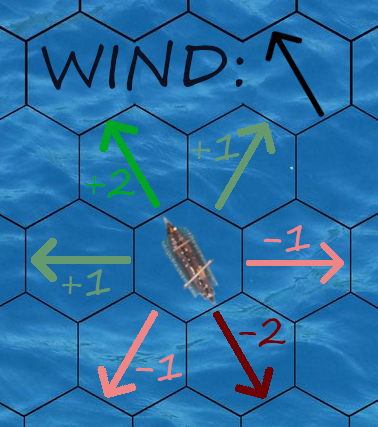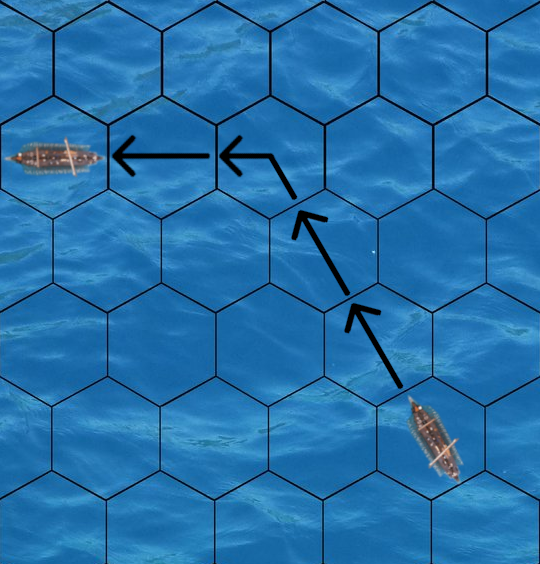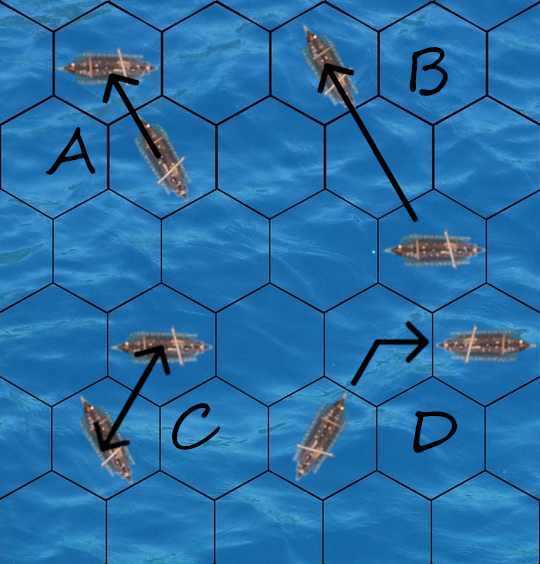Complex Scenarios: Naval Combat
Posted: Mon Feb 07, 2022 7:48 pm

This system is subject to change upon playtesting.
VoD: Pantheon is set in a time of great conflict amid warring city states, many of which are divided by land, yet even more are divided by sea. As such, it is only inevitable that conflict shall erupt between one or more individuals while upon the waves. In order to facilitate these conflicts in a quick manner, we have devised a combat system that will help to tell these epic conflicts of valor and strife.
Although there are many varieties of ships throughout both Ancient Greece and other civilizations of the ancient world, for our purposes, there are only six different kind of vessels in Naval Combat. Each of these ships have their advantages and disadvantages, which is reflected in their stats below.
| Ship Size | Speed | Maneuverability | Damage | Health | Overall Capacity | PC Capacity |
|---|---|---|---|---|---|---|
| Small (Civilian) | 6 | 3 | 1 | 10 | 5 | 2 |
| Small (Military) | 6 | 4 | 2 | 15 | 5 | 2 |
| Medium (Civilian) | 4 | 1 | 3 | 20 | 200 | 4 |
| Medium (Military) | 6 | 2 | 4 | 25 | 200 | 4 |
| Large (Civilian) | 4 | -2 | 5 | 30 | 420 | 5 |
| Large (Military) | 5 | 2 | 6 | 35 | 420 | 5 |
Setup:
When a combat occurs, each boat will be laid out on a 'battle mat' grid to show the rough terrain and where each boat is. The Storyteller will lay out an area that each ship can enter from, and captains are able to place their ships anywhere within that zone. Storytellers will also decide based on the narrative circumstances who places their ships first.
In order to not have the board bogged down by numerous ships of NPCs and other forces, Staff will be implementing a maximum of five ships per side; any other forces in naval combat are happening "off-screen".
Wind:
The winds themselves play an important role in naval combat. At the beginning of combat, the Storyteller will declare which direction the wind is blowing. It will continue to move in that direction unless acted upon by an outside force (like the use of gifts or divine blessings).
Movement is increased or decreased depending on the ships direction. At the beginning of their movement step, a ship's movement is modified by the direction it is facing, relative to the wind. Moving completely with the wind increases movement by 2. Going slightly with the wind increases it by 1. Sailing partially against the wind decreases it by 1. Heading directly into the wind decreases it by 2.
Turning your ship during movements will not alter Movement bonuses/penalties since the Wind modifier is calculated and added before movement. Wind cannot reduce a ship's speed below 1 and has no affect on attack actions, including 'Get Us Out Of Here'.

A quick compass, showing the ways wind would affect a ship's movement depending on its facing.
Initiative:
From there, Initiative will be called to determine the order of moves and attacks. Initiative is determined by the sum of each captain's Wits + Seamanship + Ship's Maneuverability. The highest value goes first, ending at the lowest value.
Player captains will then take turns in order moving their boat into position, seeking to either evade or attack each other. These turns will be comprised of two steps that are taken in order before their turn passes to the next player: Movement, then Attack.
Step One - Movement:
At the beginning of their turn, a captain moves their boat forward a number of spaces equal to their ship's speed, as modified by the wind. Anywhere during this movement, they may turn their ship up to one space to the right or the left from its facing. They do not have to move the full amount of spaces that their movement allows, but they cannot move any more than their modified movement rating.
If you do not move forward any spaces, you may instead turn your ship up to two spaces to the right or left instead of the usual one.
When moving your ship, be warned that once you have moved your ship and let go of it, that is the position it will be in. (Think Chess rules!)

A ship with a movement of five spaces, making its one turn in the middle of its move and going its maximum distance.
Step Two - Attack:
After a player has moved, they may make any of the following attack options. All attacks use the same attack pool of the attacking captain's Charisma or Wits (their choice) + Seamanship + Maneuverability versus the defending captain's Resolve or Composure (their choice) + Seamanship + Maneuverability. Success (and sometimes failure) deals an amount of damage equal to the attacking ship's damage rating.
At the beginning of Naval Combat, each captain has a number of retests they may use on any test they wish equal to their Seamanship rating. These retests do not cost Willpower to use. This number of retests lasts for the entire combat, so use them only when it counts! A captain may not use more than one of their retests on any one challenge, though one may be used by the attacker and one then used by the defender.
Note: Attack actions damage the opponent's ship, not PCs or NPCs. Wanting to do damage to PCs/NPCs means you'll need to have a separate scene run instead, either foregoing ship combat or waiting until combat is resolved to corner your adversary.
| Option | Description |
|---|---|
| Ram! | The ship collides into another ship, dealing heavy damage to the enemy ship and possibly some to itself. |
| Fire! | The ship fires its ranged weaponry upon another ship, dealing damage to the enemy ship, but not risking taking damage itself. |
| Board Them! | The ship locks positions with another ship in direct ship to ship combat, allowing for passengers to move onto the other ship. |
| Get Us Out Of Here! | The ship opens its sails fully to the winds, giving up its attack in favor of moving a little more. |

Examples of Ram! (A), Fire! (B), Board Them! (C), and Get Us Out Of Here! (D)
Ram!:
This attack requires that the attacking ship has moved forward this turn to be in contact with the defending ship. If the captain's ship has not moved this turn, it cannot initiate a ramming attack.
The attacking captain throws a test with the defending captain using the ship combat test pool. On a failure, the attacking ship takes double the defending ship's damage rating while the defending ship takes damage equal to the attacker's damage rating. On a success, the attacking ship takes damage equal to the defending ship's damage rating while the defending ship takes double the attacking ship's damage. On an exceptional success, the attacking ship takes no damage while the defending ship takes triple the attacking ship's damage.
Fire!:
This attack requires that the defending ship be within three spaces of the attacking ship. The attacking ship doesn't have to move in order to use this ability.
The attacking captain throws a test with the defending captain using the ship combat test pool. On a failure, no damage is dealt. On a success, the attacking ship deals damage equal to its damage rating to the defending ship. On an exceptional success, the attacking ship deals its damage rating plus an additional level of damage to the defending ship.
Board Them!:
This attack requires that the attacking ship is in contact with the defending ship. If the attacking captain's ship has used the ramming action this turn, it cannot initiate a boarding action.
The attacking captain throws a test with the defending captain using the ship combat test pool. On a failure, they are unable to gain purchase on the opposing ship and cannot board it. On a success, the two ships are tied together and parties from one ship may cross over to the other. The ships remain tied together until such time as:
- One ship takes enough damage to begin to sink.
- The attacking captain chooses to release the other ship at the beginning of their turn, before they move.
- The defending captain succeeds in a 'Get Us Out Of Here!' action, forcing the disengagement and breaking contact between the two ships.
- Any other action deemed by the Storyteller as appropriate.
Get Us Out Of Here!:
This action allows the captain to get even more movement out of their ship by giving up the chance to attack.
Upon choosing this action, the captain may move their ship up to another two spaces and make an additional turn to the left or the right at any point during their movement.
This action does not require a test, unless they are engaged in a boarding action with another ship. If they are bound to another ship, the attacking captain (which in this case is the one initiating this action, even if they are the ones being boarded) must make a test against the defending captain, using the ship combat test pool. If they fail, they remain where they are, unable to move. If they succeed, they are able to proceed with the move, but take 1 point of damage as they scrape against the enemy hull. If they exceptionally succeed, they are able to move as above, taking no damage in the process.
Complication - Wrecked!:
A ship that has lost all of its health is considered immobilized, at the mercy of the elements and other forces until it can repair itself enough to sail again. Due to the wooden nature of the hull, the ship is in no danger of sinking yet. Perhaps its mast has broken or its oars are smashed, but regardless, it is unable to move any further from the spot it is in.
On the immobilized ship's turn, it proceeds immediately to the attack step, skipping the movement step entirely. By forgoing their attack, the captain may attempt to repair the ship, restoring some of its health. The captain makes a static challenge of their Wits or Charisma (player's choice) + Seamanship against a difficulty of 8.
Failure results in no further damage, but no health is restored. On a success, the ship is no longer immobilized and its health is reset to half its maximum health, rounded up. Its speed is reduced by half, round up. These values become the ship's new maximum health rating and speed until the ship is able to be fully repaired in a dock (requiring a downtime action). An exceptional success restores an extra two health levels.
This action cannot be taken if the ship is presently being boarded. There is too much combat happening nearby for the sailors to be able to fix the ship without having to worry for their lives.
At the beginning of a captain's turn, if their ship is still Wrecked, that ship immediately takes 5 points of damage before the resolution of any other actions that turn.
Complication - Sinking!:
A ship that has lost twice its health levels is Destroyed and begins to take on water, beginning its descent to join Poseidon in the depths of the sea. Barring the use of some extremely supernatural feats, all those on board have three turns to get off the ship before it fully sinks beneath the waves.
For the purposes of Naval Combat, the ship is removed from the board after three turns as it has fully sunk beneath the waves. The resolution of what happens to those now stranded or floating individuals should be resolved in a separate scene. As a note, due to the numerous holes and destruction of the hull that would result in the sinking of a ship, those on board are in no peril of drowning unless they are unable to swim. There are more than enough avenues of escape for them to make it to the surface.
Fair Escape:
If you are being actively engaged, you cannot Fair Escape. To declare Fair Escape, your ship must not be Wrecked or Sinking and must begin its turn at a board edge. Then, if during an entire round, no one has declared an action towards you in that round, you may call Fair Escape. Remove your ship from the board, you have escaped.
Crew Actions:
At the beginning of a captain's Attack step, they may have other PCs on board their ship aid them in the combat. These Crew Actions give passive buffs to the captain's tests and last once chosen until the beginning of that captain's next attack step. A captain may benefit from a number of Crew Actions equal to the PC Capacity of their ship. Each player is encouraged to briefly describe what they are doing that gives their captain their bonus. These are the bonuses that players can give their captain. Each player may only choose one, but multiple players may stack their buffs.
- Damage +1 (Choice of Ramming, Ranged, Boarding, or +2 to Exceptional)
- Attack +2 (Choice of Ramming, Ranged, Boarding, or +2 to Exceptional)
- Dodge +2 (Choice of Ramming, Ranged, Boarding, or +2 to Exceptional)
- Repair (Requires Crafts: Shipwright. Restores an amount of health equal to twice their Crafts rating. Can only be used once per naval combat.)
As captains become more comfortable with their vessels, they may choose to upgrade them in preparation for fights to come. By submitting an appropriate downtime, a captain may add a permanent modifier to their ship reflecting the work they have done in training their crew or physically improving the quality of their vessel. Each downtime action allows them to add one of the following benefits to their ship until such a time as they choose to swap it out for a different kind. Any ship may only ever have a total of four of these upgrades to it unless noted otherwise. These benefits stack with the exception of Range which can only ever be added once to a ship.
- Initiative: Add +3 to your Initiative rating.
- Speed: Add +1 Speed to your ship's speed rating.
- Armor: Increase your ship's Health rating by 5.
- Range: Your 'Fire!' attacks may target ships up to four spaces away instead of the normal three.